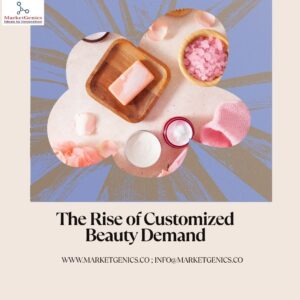Introduction
Beauty is no longer one-size-fits-all. In recent years, the customized beauty industry has emerged as a dominant trend, transforming how brands formulate, market, and deliver skincare and makeup products. Consumers increasingly demand personalized products tailored to their unique skin types, tones, and preferences. This shift is being driven by advancements in AI diagnostics, data analytics, and biotech formulations. Let’s find out MarketGenics analysis on the industry in depth.
According to MarketGenics, the global personalized beauty market was valued at around USD 38 billion in 2024 and is projected to grow around CAGR of 12.5% from 2025 to 2030, with increasing demand among Gen Z and Millennials who prioritize personalization, inclusivity, and skin health.
Challenges
- Ingredient Sourcing & Inventory Management:
- Manufacturers face difficulty maintaining large inventories of diverse ingredients for personalized formulations.
- How MarketGenics helps: Predictive analytics for ingredient demand trends, optimizing procurement and reducing excess stock.
- Regulatory Compliance Across Regions:
- Navigating different regulatory frameworks for cosmetics in each country is resource-intensive.
- How MarketGenics helps: Provides real-time regulatory tracking and tailored compliance reports for each target market.
- Production Scalability & Workflow Optimization:
- Scaling small-batch personalized production without compromising on quality or efficiency is challenging.
- How MarketGenics helps: Offers workflow optimization strategies using automation and AI-powered production models.
- Packaging Flexibility & Logistics:
- Customized products require flexible packaging designs, adding operational complexity and cost.
- How MarketGenics helps: Supplies region-specific packaging trends and logistics optimization strategies for smooth delivery.
- Supply Chain Fragmentation:
- Sourcing raw materials globally leads to fragmented, complex supply chains prone to delays.
- How MarketGenics helps: Conducts localized supplier analysis, helping brands build efficient and reliable sourcing networks.
- Product Stability Across Different Climates:
- Personalized formulations may not maintain efficacy in varying temperatures and humidity levels.
- How MarketGenics helps: Conducts regional product stability testing to ensure consistent quality in all climates.
- Short Product Development Cycles:
- Rapidly shifting consumer preferences demand faster innovation cycles, increasing pressure on R&D teams.
- How MarketGenics helps: Provides ingredient demand modeling and trend forecasting to accelerate product development.

What’s Driving the Customized Beauty Boom?
1 Growing Consumer Awareness of Skin Health
As consumers become more educated about ingredients and skincare routines, the demand for products tailored to specific skin concerns—like pigmentation, acne, or aging—has skyrocketed.
2 Technological Integration
Brands leverage AI skin diagnostics, virtual consultations, and DNA-based skincare assessments to recommend hyper-personalized product regimens.
3 Inclusive Beauty Standards
The call for shade inclusivity in makeup and custom formulas in skincare has expanded globally, fueled by the social media-driven emphasis on authenticity and diversity.
4 On-Demand Manufacturing
Customization platforms are increasingly using small-batch, on-demand production models, reducing waste and aligning with sustainability goals.
Global Market Overview
- According to MarketGenics, the North American market alone contributed approximately USD 12.3 billion to the global customized beauty industry in 2024.
- Europe is witnessing rapid growth in DNA-based and microbiome skincare solutions, especially in countries like Germany and France.
- The Asia-Pacific region, particularly South Korea and Japan, is focusing on combining traditional ingredients with modern personalization algorithms to attract both local and international buyers.
- Middle Eastern markets show increasing interest in personalized formulations suited to hot and arid climates.
Future Outlook of Customized Beauty
- Rise of AI-Powered Personalization Engines: Expect more skincare brands to adopt AI-driven recommendation engines powered by consumer data.
- Integration with Wearables and IoT Devices: Wearables will increasingly monitor skin health, feeding data back to brands for even more personalized formulations.
- Sustainability and Zero-Waste Formulas: Personalized beauty aligns naturally with sustainable production, as consumers only order what they need.
- Global Expansion of DNA-Based Skincare: Brands will move toward DNA-matched formulations, especially in premium skincare segments.
- Metaverse Influence on Beauty Shopping: Virtual avatars with accurate skin tones will help users visualize product impact before purchase.
Conclusion
Customized beauty represents a new paradigm in the global cosmetic industry, with personalization becoming central to how consumers select skincare and makeup products. As technologies evolve and consumer preferences shift, brands that can deliver personalized, effective, and compliant products will win in the long term.
MarketGenics provides in-depth market intelligence and consumer insights to help cosmetic brands align their strategies with emerging trends and buyer behavior, leading the companies to grow rapidly.


